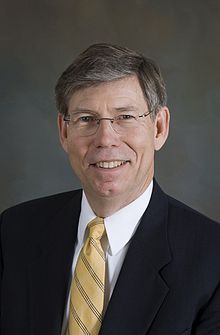Alex Sink (Democrat) and Bill McCollum (Republican) are contestants in the 2010 gubernatorial elections in Florida. Both hold respectable positions in their state; while Sink is the Chief Financial Officer of Florida, McCollum is the Attorney General for the State. This article presents an unbiased comparison of the two contestants.
Comparison chart
| | Alex Sink | Bill McCollum |
|---|---|---|
 |  | |
| Residence | Tampa, Florida | Florida |
| Preceded by | Tom Gallagher | Charlie Crist |
| Date of birth | June 5, 1948 | July 12, 1944 |
| Political party | Democratic | Republican |
| Spouse(s) | Bill McBride (1987-Present) | Ingrid Seebohm McCollum |
| Introduction (from Wikipedia) | Adelaide "Alex" Sink (born 5 June 1948) is the Chief Financial Officer for the state of Florida and treasurer on the board of trustees of the Florida State Board of Administration. She is currently a candidate for Governor of Florida. | Ira William "Bill" McCollum, Jr. (born July 12, 1944 in Brooksville, Florida) is Florida Attorney General and a candidate in the 2010 Florida gubernatorial election. A Republican, he is Florida's 36th attorney general, taking office in 2007. |
| Children | two | three |
| Occupation | Chief Financial Officer, state of Florida | Florida Attorney General |
| Position on healthcare | Tepid support of healthcare reform legislation. | Vehemently opposed to healthcare reform legislation. |
| Position on abortion | In favor of status quo | Strongly opposed to abortion and state funding for stem cell research |
| Position on immigration | Opposes illegal immigration but also feels that Arizona's tough new immigration law is not appropriate. | Supports Arizona's law and has proposed a bill for Florida modeled on the Arizona legislation. |
Comparison of Economic Policy
Bill McCollum states that he wants to "foster an environment where taxes are low, people are working, students are learning, and our communities are safe." He has created a "roadmap" outlining his economic policy. Highlights include:
- Tax reductions for businesses
- Property tax freeze and a cap on local government spending
- Litigation reform to lower costs for small businesses and to "reduce Florida's doctor shortage".
Alex Sink's plan for jobs and the economy is divided into short- and long-term initiatives. In the short term, she proposes to:
- "Stabilize and expand" small business
- "encouraging" innovative programs for better access to venture capital, micro-lending,
- coaching on budgeting, money-management, use of financial intermediaries, and other things that larger businesses take for granted.
- creating a small business ombudsman
- defer state corporate income taxes of "qualified" startup businesses for the first three years.
- incentivize employers to keep jobs in Florida by
- tying tax incentives to job creation.
- making sure that Florida businesses start getting more state contracts
- Revive Economic Sectors that Can Create Jobs Quickly
- market Florida as the premier spot to visit and hold conventions.
- jumpstart housing markets by attracting seniors and future retirees
- business counseling services on exporting
Energy Policy
Both candidates are in favor of Florida's new Property Assessed Clean Energy (PACE) program.
Alex Sink's energy policy calls for increasing the money Florida receives from the federal government for clean energy and energy efficiency investment, expanding low-income weatherization assistance programs, expanding public-private partnerships for clean energy research, "work with" utilities and the energy industry to expand the use of these so-called "smart-grid" technologies, and "work with" utility companies to promote educational outreach to consumers about electricity pricing.
McCollum's energy policy is in favor of nuclear reactors and "clean coal", promoting renewable fuel sources, expedite bio-fuel. He claims to be in favor of "market-based strategies" but opposes cap and trade. His plan calls for building an infrastructure for electric plug-in vehicles.
Position on Healthcare reform
Bill McCollum is vehemently opposed to the healthcare reform legislation passed in 2010. He "filed and leads a lawsuit" to have the legislation declared unconstitutional on the basis that "Congress exceeded its powers in penalizing individuals for failing to purchase health insurance, and for commandeering state assets in unprecedented ways."[1]
Alex Sink's website does not provide information about her healthcare policy. She has said that while not perfect, the healthcare reform legislation is better than doing nothing.[2]
Position on Immigration
Both Sink and McCollum talk tough against illegal immigration. McCollum, however, supports Arizona's tough new immigration law, whereas Sink opposes it, saying that it "The law passed in Arizona does not meet Florida's needs." because it's the responsibility of the federal government to prevent immigrants from illegally crossing the border.
McCollum has proposed an immigration bill modeled after Arizona's law.
Position on Abortion
A staunch conservative on this issue, McCollum is "pro-life" and against abortions. He is also opposed to the use of state or federal funding for embryonic stem cell research.
Sink has been less unequivocal about her position on these issues. Unlike more liberal Democrats, her website does not contain information on her position on these issues.
Education Policy
The key themes in Alex Sink's education policy are:
- funding workforce training and development programs for schools, with "public-private partnerships"
- merit pay for teachers and charter schools
McCollum's website has a more detailed education policy paper, the key themes of which are:
- creating a "merit based" compensation system
- Support Amendment 8 to "right size the class size"
- Extend full certification in Florida for Troops-to-Teachers and Teach-for-America teachers
- Require Florida high school students to take at least one internet based class
Sink vs McCollum in opinion polls
| Poll Source | Dates Administered | Bill McCollum | Alex Sink |
|---|---|---|---|
| Quinnipiac | August 11-16, 2010 | 29% | 31% |
| Mason-Dixon | August 9-11, 2010 | 35% | 37% |
| Ipsos/Florida Newpapers | August 6-10, 2010 | 26% | 30% |
| Rasmussen Reports | August 2, 2010 | 27% | 31% |
| The Florida Poll | July 24-28, 2010 | 26% | 27% |
| Quinnipiac | July 22-27, 2010 | 27% | 26% |
| Public Policy Polling | July 16-18, 2010 | 23% | 37% |
| Ipsos/Reuters | July 9-11, 2010 | 30% | 31% |
| Florida Chamber of Commerce | June 9-13, 2010 | 30% | 26% |
| Quinnipiac | June 7, 2010 | 33% | 25% |
| Rasmussen Reports | June 7, 2010 | 40% | 38% |
| Rasmussen Reports | May 16, 2010 | 43% | 35% |
| Mason-Dixon | May 7, 2010 | 45% | 36% |
| Rasmussen Reports | March 18, 2010 | 47% | 36% |
| Public Policy Polling | March 5-8, 2010 | 44% | 31% |
| Rasmussen Reports | February 18, 2010 | 48% | 35% |
| Fabrizo/McLaughlin | January 31, 2010 | 41% | 32% |
| Rasmussen Reports | January 27, 2010 | 46% | 35% |
| Quinnipiac | January 27, 2010 | 41% | 31% |


 Kendrick Meek
Kendrick Meek  John Hickenlooper
John Hickenlooper  Ned Lamont
Ned Lamont  Jan Brewer
Jan Brewer
Comments: Alex Sink vs Bill McCollum